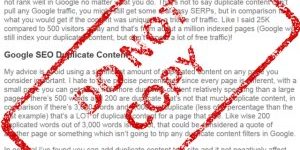SEO Myths: Page Size and Keyword Density article updated April 2014. Had a discussion at alt.internet.search-engines (in 2006: time passes so quickly, that’s 8 years ago!) under the thread “Re: Links and PR” with Borek, and put my answer here instead of on the SEO newsgroup (which in 2014 is DEAD other than a Google Groups version). Won’t waste some half decent content on a newsgroup when I can write a post SEO Myths: Page Size and Keyword Density :-) Google SEO Page Size Borek asked- “Let’s see… Is there optimal size for a page SEO Wise?” I replied- For Google below 101KB and preferably more than a few paragraphs of text so your content includes derivative search phrases (based […]
Continue Reading SEO Keyword Density


How Many Inbound and Outbound Links for High Ranking?
hi Dave
I want to know that with page size and Keyword density, how much inbound and outbound links are good for high ranking.
thanking in Advance
John
What is the Best Keyword Density?
Is there any thumb rule as regards to page size (text only without the html) and keyword density? How much density should be considered good without causing seach engine spam?
Link Checker SEO Tools
Thank you for the tips.
I am hoping you could help me. I have spent the last few months looking for a really simple link checker tool. I was hoping you would know of one that could help me.
I have a list of urls that we have added a link to, we have the anchor text, and we have the links that the anchor text is pointing to.
Every link check SEO tool and SEO program that I have tried requires that we add a SINGLE DOMAIN and then it verifies that the link is pointing back (reciprocal linking).
I would like to upload a list of different domains that different links are pointing to.
Thus, I would add a csv containing the link where the url is, the anchor text and the url the link is pointing to and the software would verify that the links are correct.
Thanks.
Link Checker SEO Tools
SEO Theory : Percentage of Exact Match Keyword Phrases
Keyword variation increases natural relevance – I believe that onsite or offsite keywords (titles are links remember) – However, if you go higher in the percentage of exact keyword phrase matches for your whole site, this is bad. If you are low with tangential flirting on the same theme but not exact matches this is good.
I think Google has two ideas in their formula, one is yes matches are good (relevance), the second being if the site as a whole has too many pages or post written with exact matches for popular searches (or maybe simply too concise title) in the title (percentage wise) this way it sends a flag you are trying to game the system. The ideas are diametrically opposed on one hand but as a whole it works well for them.
My idea (I could very wrong) is not just repetitive but exact keyword matches are bad. That is if you target the phrase “WordPress SEO” This would not be your title (which is link, not because it is not relevant but, it is too exact. I rarely see exact keyword matches rank any more as well as phases.
Further I think Google scans a site as a whole and gives it a percentage rank,(maybe I am wrong on this) and if the site is composed of short titles with exact keyword matches on popular searches (like eHow the poster child of Panda) than you get a penalty. It tries to use LSI and natural people writing for the good bucket.
If 50% of your site is short titles with exact matches you are not going to rank as high.
This is a different idea than Long-tail because spammers try to rank for 2 to 3 word phases, not 5 to 7 word phrases. So I have a theory even though on the relevancy side good will rank a page high if it is short and dense in the title, it will rank the site with a dampening factor if too many are short titles.
Varying keywords in links (internal and external) as well as onsite things like H tags in your related post etc keyword phrases is important for SEO because it helps the broad algorithm concept of relevance without being spammy or stuffing.
I know I know these things, but on my sites I have not had time to relevant, hence, I believe Google is looking at these sites as more cookie cutter (not good) or keyword repetitive. It is about really using your theme to leverage relevance which in a sense liberates me to simply write in a natural style.
I am using thesaurus.com to help stimulate creativity about different ways to express myself.
Therefore I have a lot of work to do on my sites which means going back and making it more interesting and natural and using the tools you have given us to make this easier from a structural side.
SEO Theory : Percentage of Exact Match Keyword Phrases